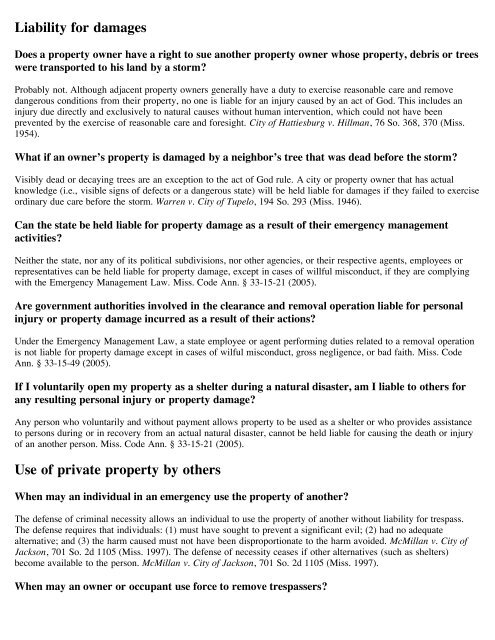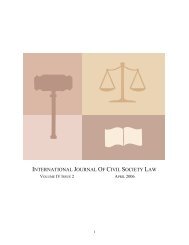Hurricane Katrina: Legal Issues - Columbus School of Law
Hurricane Katrina: Legal Issues - Columbus School of Law
Hurricane Katrina: Legal Issues - Columbus School of Law
You also want an ePaper? Increase the reach of your titles
YUMPU automatically turns print PDFs into web optimized ePapers that Google loves.
Liability for damages<br />
Does a property owner have a right to sue another property owner whose property, debris or trees<br />
were transported to his land by a storm?<br />
Probably not. Although adjacent property owners generally have a duty to exercise reasonable care and remove<br />
dangerous conditions from their property, no one is liable for an injury caused by an act <strong>of</strong> God. This includes an<br />
injury due directly and exclusively to natural causes without human intervention, which could not have been<br />
prevented by the exercise <strong>of</strong> reasonable care and foresight. City <strong>of</strong> Hattiesburg v. Hillman, 76 So. 368, 370 (Miss.<br />
1954).<br />
What if an owner’s property is damaged by a neighbor’s tree that was dead before the storm?<br />
Visibly dead or decaying trees are an exception to the act <strong>of</strong> God rule. A city or property owner that has actual<br />
knowledge (i.e., visible signs <strong>of</strong> defects or a dangerous state) will be held liable for damages if they failed to exercise<br />
ordinary due care before the storm. Warren v. City <strong>of</strong> Tupelo, 194 So. 293 (Miss. 1946).<br />
Can the state be held liable for property damage as a result <strong>of</strong> their emergency management<br />
activities?<br />
Neither the state, nor any <strong>of</strong> its political subdivisions, nor other agencies, or their respective agents, employees or<br />
representatives can be held liable for property damage, except in cases <strong>of</strong> willful misconduct, if they are complying<br />
with the Emergency Management <strong>Law</strong>. Miss. Code Ann. § 33-15-21 (2005).<br />
Are government authorities involved in the clearance and removal operation liable for personal<br />
injury or property damage incurred as a result <strong>of</strong> their actions?<br />
Under the Emergency Management <strong>Law</strong>, a state employee or agent performing duties related to a removal operation<br />
is not liable for property damage except in cases <strong>of</strong> wilful misconduct, gross negligence, or bad faith. Miss. Code<br />
Ann. § 33-15-49 (2005).<br />
If I voluntarily open my property as a shelter during a natural disaster, am I liable to others for<br />
any resulting personal injury or property damage?<br />
Any person who voluntarily and without payment allows property to be used as a shelter or who provides assistance<br />
to persons during or in recovery from an actual natural disaster, cannot be held liable for causing the death or injury<br />
<strong>of</strong> an another person. Miss. Code Ann. § 33-15-21 (2005).<br />
Use <strong>of</strong> private property by others<br />
When may an individual in an emergency use the property <strong>of</strong> another?<br />
The defense <strong>of</strong> criminal necessity allows an individual to use the property <strong>of</strong> another without liability for trespass.<br />
The defense requires that individuals: (1) must have sought to prevent a significant evil; (2) had no adequate<br />
alternative; and (3) the harm caused must not have been disproportionate to the harm avoided. McMillan v. City <strong>of</strong><br />
Jackson, 701 So. 2d 1105 (Miss. 1997). The defense <strong>of</strong> necessity ceases if other alternatives (such as shelters)<br />
become available to the person. McMillan v. City <strong>of</strong> Jackson, 701 So. 2d 1105 (Miss. 1997).<br />
When may an owner or occupant use force to remove trespassers?

















